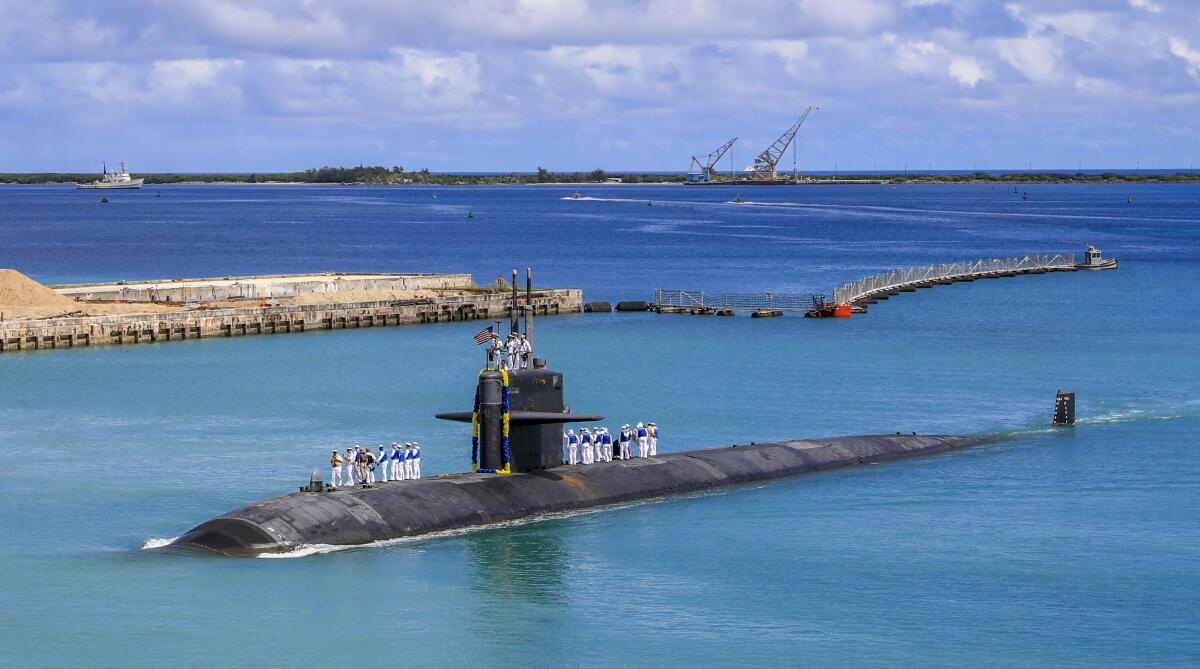China and France assail U.S.-Australia deal on nuclear-powered submarines

- Share via
WASHINGTON — The Biden administration Thursday was facing acute anger from a rival, China, and one of its closest allies, France, over a pact that will help Australia develop nuclear-powered submarines.
The nuclear deal, which also includes the United Kingdom, was announced by President Biden on Wednesday and immediately threatened to aggravate tensions with Beijing and potentially damage an improving relationship with Paris.
It gives Australia U.S. technology to build a fleet of nuclear-powered submarines, which are stealthier, have longer and deeper range and are more sophisticated than conventional subs. The agreement was seen as a major step in Biden’s vow to form a grand alliance to curb China’s economic and military influence in the Indo-Pacific region. U.S. tensions with China are on the rise, and containing Beijing is a top Biden administration foreign policy priority.
Beijing on Thursday expressed predictable outrage at the deal, criticizing it for embracing a cold- war mentality that will stoke an arms race, damage international nonproliferation efforts and threaten regional peace and stability.
The United States and Britain “are using nuclear exports for geopolitical gaming tools and applying double standards which is extremely irresponsible,” Chinese foreign ministry spokesman Zhao Lijian said. He called on the pair, with Australia, to “shake off their cold war mentality and do more to contribute to peace and stability.”
Administration officials countered Thursday afternoon that the defense deal was not targeting Beijing, even though most experts saw China very much in the backdrop of the decision.
“It is not aimed at any countries,” Secretary of State Antony J. Blinken said during a news conference at which he was joined by Secretary of Defense Lloyd J. Austin III and their Australian counterparts. “It’s certainly not aimed at holding anyone back. It is [about] ... upholding the rules-based international order that both Australia and the United States deeply believe in.”
Australian Foreign Minister Marise Payne added, “We’ve been very consistent in our desire to have constructive engagement with China ... [and] we place great importance on the relationship.”
French leaders, meanwhile, on Thursday expressed indignation, saying they were completely blindsided by the submarine deal — criticism that would seem to undercut the Biden administration’s efforts to repair relationships with allies that it asserts were neglected under President Trump.
The pact leaves France in the lurch by scuttling a $66-billion deal that Paris won five years ago to supply Australia with less powerful conventional submarines.
French Foreign Minister Jean-Yves Le Drian, in an interview with a French radio station Thursday, complained bitterly about the “brutal decision,” which he suggested was more typical of actions that took place under the Trump administration. Adding insult to injury, Blinken is known to be a Francophile.
“This is not done between allies,” Le Drian said.
“The American choice to exclude a European ally and partner such as France from a structuring partnership with Australia, at a time when we are facing unprecedented challenges in the Indo-Pacific region, whether in terms of our values or in terms of respect for multilateralism based on the rule of law, shows a lack of coherence that France can only note and regret,” Le Drian said earlier Thursday in a statement issued jointly with France’s armed forces minister.
The new defense arrangement, known as AUKUS, an acronym of the three countries’ names, comes as Europe is attempting to assert influence and as Britain breaks away from the continent. In that vein, Britain joining forces with the U.S. and Australia seems, as Le Drian put it, “a knife in the back.”
But Blinken and White House spokeswoman Jen Psaki said that the French had been informed about the deal, although the secretary of State acknowledged U.S. officials broke the news to Paris just 48 hours ago.
It also may end up being counterproductive to Biden’s stated interest in recruiting NATO and the European Union to stand united against perceived Chinese aggression. The French may feel especially betrayed after cheering Biden’s arrival in the White House and giving Blinken an effusively warm reception during a visit to Paris earlier this year. Blinken spent much of his childhood in France and, in recent visits, has given interviews in Paris in fluent French.
“We strongly, strongly welcome European countries playing an important role in the Indo-Pacific and elsewhere,” Blinken said. “France in particular is a vital partner on this and so many other things stretching back a long time and stretching toward the future.”
Experts said the administration is calculating that the submarine deal will not do serious long-term damage to relations between Washington and the European Union. A U.S.-European alliance is a critical component of any effort to counter China, and Washington and Paris will likely be eager to put any fallout behind them, said Bonnie Glaser, who heads the Asia program at the German Marshall Fund program in the United States.
China’s biggest dread about the Biden administration, she said, is that it will make progress in rebuilding alliances weakened by Trump. “Biden knows, and so do the Australians,” Glaser said, “that the relationship with France and the European Union is so important that they will invest more in it and continue to try to repair it.”
More to Read
Get the L.A. Times Politics newsletter
Deeply reported insights into legislation, politics and policy from Sacramento, Washington and beyond. In your inbox twice per week.
You may occasionally receive promotional content from the Los Angeles Times.











